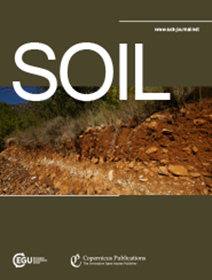在津巴布韦进行的两项为期 8 年的试验中,覆盖物的应用是解释保护性农业下土壤有机碳储量增加的首要因素
IF 5.8
2区 农林科学
Q1 SOIL SCIENCE
引用次数: 0
摘要
摘要。保护性耕作(CA)结合了减少耕作或免耕、永久性土壤覆盖和改良轮作,经常被作为一种气候智能型做法加以推广。然而,我们对保护性耕作及其三大原则对撒哈拉以南非洲低投入种植系统中表层和底层土壤有机碳储量的影响的了解还相当有限。本研究于 2013 年在津巴布韦的两个长期实验点进行。土壤类型分别为Domboshava培训中心(DTC)的赤红壤和津巴布韦大学农场(UZF)的黄壤。研究了以下六种处理,重复四次:常规耕作(CT)、常规耕作加轮作(CTR)、不耕作(NT)、不耕作加地膜覆盖(NTM)、不耕作加轮作(NTR)以及不耕作加地膜覆盖和轮作(NTMR)。主要作物为玉米(Zea mays L.),轮作处理包括豇豆(Vigna unguiculata L. Walp.)。从 0-5、5-10、10-15、15-20、20-30、30-40、40-50、50-75 和 75-100 厘米深度取样,测定土壤有机碳(SOC)浓度和土壤容重。还估算了所有处理的土壤累积有机投入量。与 NT 和 CT 处理相比,在 UZF,NTM、NTR 和 NTMR 处理在顶部 5 厘米和顶部 10 厘米的等效土壤质量中的 SOC 储量显著较高(p<0.05),而在 DTC,与 NT 和 CT 处理相比,NTM 和 NTMR 处理在顶部 5 厘米的 SOC 储量仅显著较高。单用新界处理对顶部的 SOC 储量略有负面影响。从整个 100 厘米土壤剖面来看,不同处理之间的累积 SOC 储量差异不大。我们的研究结果表明,在 CA 种植系统中,作物秸秆覆盖在提高 SOC 储量方面发挥着重要作用,但这种作用仅限于表层土壤。在这两个地点,NTM 处理的土壤有机碳累积输入量最高,这可能是对 SOC 储量产生积极影响的原因。此外,我们的研究结果表明,在这些低氮投入的种植系统中,至少需要结合包括地膜覆盖在内的两种 CA 原则才能增加 SOC 储量。本文章由计算机程序翻译,如有差异,请以英文原文为准。
Mulch application as the overarching factor explaining increase in soil organic carbon stocks under conservation agriculture in two 8-year-old experiments in Zimbabwe
Abstract. Conservation agriculture (CA), combining reduced or no tillage, permanent soil cover, and improved rotations, is often promoted as a climate-smart practice. However, our understanding of the impact of CA and its respective three principles on top- and subsoil organic carbon stocks in the low-input cropping systems of sub-Saharan Africa is rather limited. This study was conducted at two long-term experimental sites established in Zimbabwe in 2013. The soil types were abruptic Lixisols at Domboshava Training Centre (DTC) and xanthic Ferralsol at the University of Zimbabwe farm (UZF). The following six treatments, which were replicated four times, were investigated: conventional tillage (CT), conventional tillage with rotation (CTR), no tillage (NT), no tillage with mulch (NTM), no tillage with rotation (NTR), and no tillage with mulch and rotation (NTMR). Maize (Zea mays L.) was the main crop, and treatments with rotation included cowpea (Vigna unguiculata L. Walp.). The soil organic carbon (SOC) concentration and soil bulk density were determined for samples taken from depths of 0–5, 5–10, 10–15, 15–20, 20–30, 30–40, 40–50, 50–75 and 75–100 cm. Cumulative organic inputs to the soil were also estimated for all treatments. SOC stocks at equivalent soil mass were significantly (p<0.05) higher in the NTM, NTR and NTMR treatments compared with the NT and CT treatments in the top 5 cm and top 10 cm layers at UZF, while SOC stocks were only significantly higher in the NTM and NTMR treatments compared with the NT and CT treatments in the top 5 cm at DTC. NT alone had a slightly negative impact on the top SOC stocks. Cumulative SOC stocks were not significantly different between treatments when considering the whole 100 cm soil profile. Our results show the overarching role of crop residue mulching in CA cropping systems with respect to enhancing SOC stocks but also that this effect is limited to the topsoil. The highest cumulative organic carbon inputs to the soil were observed in NTM treatments at the two sites, and this could probably explain the positive effect on SOC stocks. Moreover, our results show that the combination of at least two CA principles including mulch is required to increase SOC stocks in these low-nitrogen-input cropping systems.
求助全文
通过发布文献求助,成功后即可免费获取论文全文。
去求助
来源期刊

Soil
Agricultural and Biological Sciences-Soil Science
CiteScore
10.80
自引率
2.90%
发文量
44
审稿时长
30 weeks
期刊介绍:
SOIL is an international scientific journal dedicated to the publication and discussion of high-quality research in the field of soil system sciences.
SOIL is at the interface between the atmosphere, lithosphere, hydrosphere, and biosphere. SOIL publishes scientific research that contributes to understanding the soil system and its interaction with humans and the entire Earth system. The scope of the journal includes all topics that fall within the study of soil science as a discipline, with an emphasis on studies that integrate soil science with other sciences (hydrology, agronomy, socio-economics, health sciences, atmospheric sciences, etc.).
 求助内容:
求助内容: 应助结果提醒方式:
应助结果提醒方式:


